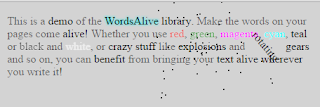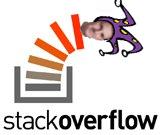What I've learned from four months on social media
 To be frank, I never intended this to last too much. I have been (and proudly, like a true hipster) avoiding creating a Facebook account and the Twitter one I only opened because I wanted to explore it as a machine to machine messaging system and never looked back after that idea bombed. So this year I went on Facebook and reactivated my interest in Twitter, now with a more social focus. The reason doesn't really matter, but I'll share it anyway: I had an asshole colleague that refused to talk to me on anything else other than Facebook Messenger. Now we barely talk to each other, anyway. So, what have I learned from this experience? Before I answer that question, I want to tell you about how I thought it would go when I went in.
To be frank, I never intended this to last too much. I have been (and proudly, like a true hipster) avoiding creating a Facebook account and the Twitter one I only opened because I wanted to explore it as a machine to machine messaging system and never looked back after that idea bombed. So this year I went on Facebook and reactivated my interest in Twitter, now with a more social focus. The reason doesn't really matter, but I'll share it anyway: I had an asshole colleague that refused to talk to me on anything else other than Facebook Messenger. Now we barely talk to each other, anyway. So, what have I learned from this experience? Before I answer that question, I want to tell you about how I thought it would go when I went in.What I thought going in
I have been keeping this blog since 2007, carefully sharing whatever I thought important, especially since I am a very forgetful person and I needed a place to store valuable tidbits of information. So when Facebook blew up I merely scoffed. Have other people use some sort of weird platform to share what they think; let them post cat videos and share whenever they go to the toilet: I am above this. I carefully study and solve the problem, read the book, research new stuff, link to everything in the information that I think relevant. I have my own template, I control the code on my blog, people can chat with me and others directly, comment on whatever I have done. I can also edit a post and update it with changes that I either learn as I evolve. My posts have permanent links that look like their title, suckers! I really don't need Facebook at all.
And Twitter. Phaw! 140 characters? What is this, SMSes online? If you really have something to say, say it in bulk. It's a completely useless platform. I might take a second look at it and use it as a chat system for the blog, at most (I actually did that for a while, a long time ago). I am not social, I am antisocial, suckers! I really don't need Twitter at all.
There you go. Superior as fuck, I entered the social media having a lot of smug preconceptions that I feel ashamed for. I apologize.
So what did I learn from months on Facebook? Nothing. Hah! To be honest, I didn't disrespect Facebook that much to begin with. I had high hopes that once I connect with all my friends I would share of their interesting experiences and projects, we would communicate and collaborate better, we would organize more parties or gettogethers, meet up more frequently if we are in the same area. Be interesting, passionate; you know... social. Instead I got cute animal videos, big pointless images with texts plastered all over them - like this would give more gravitas to bland clichés, pictures of people on vacation or at parties - as if I care about their mugs more than the location, political opinion bile, sexist jokes, driving videos, random philosophical musings, and so on and so on. Oh, I learned a lot from Facebook, most of it being how many stupid and pointless things people do. Hell, I am probably friends with people I don't really know for a good reason, not just because I am an asshole who only thinks about himself!
Not everything is bad, clearly. The messenger is the only widespread method of online communication outside email. I know when people's birthdays are (and what day it is currently). People sometimes post their achievements, link to their blog posts, share some interesting information that they either stumbled upon on the Internet (most of the time) or thought about or did themselves, there are events that I learn about from other people going there, like concerts and software meetings and so on. Oh, and the Unfollow button is a gem, however cowardly it is! However, I am no longer "reading my Facebook", I am scrolling at warp speed. I've developed internal filters for spammy bullshit and most of the time, after going through three days worth of stuff, I have only five or six links that I opened for later, one of them being probably a music video on YouTube. It still takes a huge amount of time sifting through all the shit.
What about Twitter? Huge fucking surprise there! Forced to distill the information they share, people on Twitter either share links to relevant content or small bits of their actual thoughts, real time, while they are thinking them. There is not a comfortable mechanism for long conversations, group conferences or complicated Like-like mechanism. You do have a button to like or retweet something, but it's more of a nod towards the author that what they shared is good, not some cog in an algorithm to tell someone what YOU need. More work stuff is being shared, books that have been read and enjoyed, real time reactions to TV or cinema shows, bits of relevant code, all kind of stuff. In fact, very few people that spam Facebook are even active on Twitter. Twitter is less about a person than about the moment; it's more Zen if you want to go that way. You are not friends with folks, you just appreciate what they share. It's less personal, yet more revealing, a side effect that I had not expected. And when you reply to a tweet, you are aware of how public it is and how disassociated from the post you reply to it is. There is no ego trip on posting the most sarcastic comment like on Facebook.
Not everything is rosy there, either. They have a similar Facebooky thing that shows the title and the image/video of a shared link so you can open them directly there. So if I want to emulate the same type of behaviour on Twitter, you can by endlessly posting links to stupid stuff and follow other people who do that. You can Follow whoever you want and that means that if you are exaggerating, you end up with a deluge of posts that you have no chance of getting out of. I still haven't gotten used to the hashtag thingie. I only follow people and I only use the default Twitter website, so I am not an "advanced user", but I can tell you that after three days worth of Twitter posts that I have missed, I open around 50 links that I intend to follow up on.
So?
Some of the mental filters developed apply to both situations. The same funny ha-ha video that spams the Facebook site can be ignored just as well on the Twitter page as well. Big font misspelled or untranslatable text smacked on top of a meaningless picture is ignored by tradition, since it looks like a big ad I already have a trained eye for from years of browsing the web before ad blockers were invented.
Some of the opinion pieces are really good and I wouldn't have had the opportunity to read them if all I was looking for was news sites and some RSS feed, yet because of the time it takes to find them, I get less time in which I can pay attention to them. I catch myself feeling annoyed with the length of a text or skipping paragraphs, even when I know that those paragraphs are well researched pieces of gold. I feel like I still need to train myself to focus on what is relevant, yet I am so fucking unwilling to let go of the things that are not.
With tweaking, both platforms may become useful. For example one can unfollow all his friends on Facebook, leaving only the messaging and the occasional event and birthday notification to go through. It's a bit radical, but you can do it. I haven't played with the "Hide post (show fewer posts like this)" functionality, it could be pretty cool if it works. Twitter doesn't have a good default filtering system, though, even if I get more useful information from it. That doesn't mean that specialized Twitter clients don't have all kinds of features I have not tried. There is also the software guy way: developing your own software to sift through the stuff. One idea I had, for example, was something that uses OCR to restore images and videos to text.
Bottom line: Facebook, in its raw form, it's almost useless to me. I remember some guy making fun of it and he was so right: "Facebook is not cool. Parents are on it!". You ask someone to connect with you, which is a two directional connection, even if they couldn't care less about you, then you need to make an effort to remove the stuff they just vomit online. The graphical features of the site make it susceptible to graphical spam - everything big and flashy and lacking substance. Twitter is less so and I have been surprised to see how much actual usable information is shared there. The unidirectional following system also leads to more complex data flow and structure, not just big blobs of similar people sharing base stuff that appeals to all.
But hey! "What about you, Siderite? What are you posting on Facebook and Twitter?" You'll just have to become friends and follow me to see, right? Nah, just kidding. My main content creation platform is still Blogger and I am using this system called If This Then That to share any new post on both social networks. Sometimes I read some news or I watch some video and I use the Facebook sharing buttons to express my appreciation for the content without actually writing anything about it and occasionally I retweet something that I find really spectacular on Twitter. Because of my feelings towards the two systems, even if I find an interesting link on Tweeter, I just like it then share it on Facebook if I don't feel it's really something. So, yeah, I am also spamming more on Facebook than on Twitter.
What else?
I haven't touched Google+, which I feel is a failed social platform and only collects various YouTube comments without accurately conveying my interests. I also haven't spoken about LinkedIn, which I think is a great networking platform, but I use it - as I believe it should be - exclusively for promoting my work and finding employment. I've used some strong language above, not because I am passionate about the subject but because I am not. I find it's appropriate though and won't apologize for it. I couldn't care less if people go or don't go on social networks and surely I am not an trendsetter so that Zuckerberg would worry. I only shared my own experience.
For the future I will probably continue to use both systems unless I finally implement one of the good ideas that would allow me to focus more on what matters, thus renouncing parts of my unhealthy habits. I am curious on how this will evolve in the near future and after I leave my current hiatus and go look for employment or start my own business.
 The focus of
The focus of  I have been a professional in the IT business for a lot of years, less if you consider just software development, more if you count that my favorite activity since I was a kid was to mess with a computer or another. I think I know how to develop software, especially since I've kind of built my career on trying new places and new methods for doing that. And now people come to me and ask me: "Can I learn too? Can you teach me?". And the immediate answer is yes and no (heh! Learnt from the best politicians that line) Well, yes because I believe anyone who actually wants to learn can and no because I am a lousy teacher. But wait a minute... can't I become one?
I have been a professional in the IT business for a lot of years, less if you consider just software development, more if you count that my favorite activity since I was a kid was to mess with a computer or another. I think I know how to develop software, especially since I've kind of built my career on trying new places and new methods for doing that. And now people come to me and ask me: "Can I learn too? Can you teach me?". And the immediate answer is yes and no (heh! Learnt from the best politicians that line) Well, yes because I believe anyone who actually wants to learn can and no because I am a lousy teacher. But wait a minute... can't I become one? During one revamp of the blog I realized that I didn't have images for some of my posts. I had counted pretty much on the Blogger system that provides a
During one revamp of the blog I realized that I didn't have images for some of my posts. I had counted pretty much on the Blogger system that provides a  The book was nothing if not captivating, its pace much better than for the Magicians trilogy, but as in those books, it was really really difficult to empathize with any of the characters.
The book was nothing if not captivating, its pace much better than for the Magicians trilogy, but as in those books, it was really really difficult to empathize with any of the characters. I came upon a
I came upon a 

 My blog is hosted by
My blog is hosted by  I've noticed an explosion of web sites that try to put all of their stuff on a single page, accessible through nothing else than scrolling.
I've noticed an explosion of web sites that try to put all of their stuff on a single page, accessible through nothing else than scrolling. 
